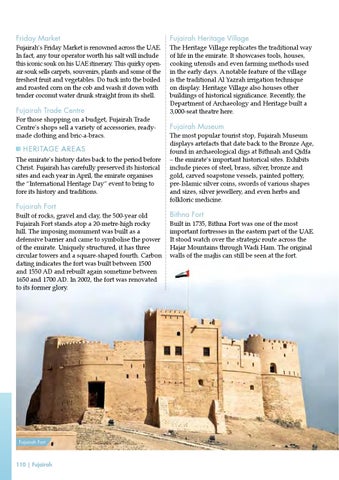Friday Market
Fujairah’s Friday Market is renowned across the UAE. In fact, any tour operator worth his salt will include this iconic souk on his UAE itinerary. This quirky openair souk sells carpets, souvenirs, plants and some of the freshest fruit and vegetables. Do tuck into the boiled and roasted corn on the cob and wash it down with tender coconut water drunk straight from its shell.
Fujairah Trade Centre
For those shopping on a budget, Fujairah Trade Centre’s shops sell a variety of accessories, readymade clothing and bric-a-bracs.
HERITAGE AREAS The emirate’s history dates back to the period before Christ. Fujairah has carefully preserved its historical sites and each year in April, the emirate organises the “International Heritage Day” event to bring to fore its history and traditions.
Fujairah Fort
Built of rocks, gravel and clay, the 500-year old Fujairah Fort stands atop a 20-metre-high rocky hill. The imposing monument was built as a defensive barrier and came to symbolise the power of the emirate. Uniquely structured, it has three circular towers and a square-shaped fourth. Carbon dating indicates the fort was built between 1500 and 1550 AD and rebuilt again sometime between 1650 and 1700 AD. In 2002, the fort was renovated to its former glory.
Fujairah Fort
110 | Fujairah
Fujairah Heritage Village
The Heritage Village replicates the traditional way of life in the emirate. It showcases tools, houses, cooking utensils and even farming methods used in the early days. A notable feature of the village is the traditional Al Yazrah irrigation technique on display. Heritage Village also houses other buildings of historical significance. Recently, the Department of Archaeology and Heritage built a 3,000-seat theatre here.
Fujairah Museum
The most popular tourist stop, Fujairah Museum displays artefacts that date back to the Bronze Age, found in archaeological digs at Bithnah and Qidfa – the emirate’s important historical sites. Exhibits include pieces of steel, brass, silver, bronze and gold, carved soapstone vessels, painted pottery, pre-Islamic silver coins, swords of various shapes and sizes, silver jewellery, and even herbs and folkloric medicine.
Bithna Fort
Built in 1735, Bithna Fort was one of the most important fortresses in the eastern part of the UAE. It stood watch over the strategic route across the Hajar Mountains through Wadi Ham. The original walls of the majlis can still be seen at the fort.
